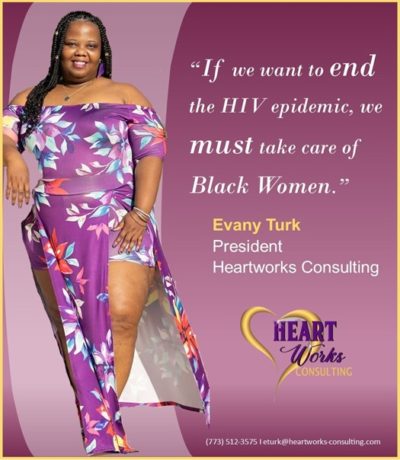by: Evany Turk
November 22, 2021

Evany Turk, President of HeartWorks Consulting
I was diagnosed with HIV at the age of 24. Prior to that, I was living my best 24-year-old life. I had a child, great friends, a fun social life, a good-paying job, and was in love. My biggest goal was to make $50K by my 30th birthday. Then out of nowhere, I felt like I was hit in the chest with a wrecking ball: “Your HIV test came back positive.” The room went dark. My first thought was, “No one will love me anymore.” My next thought was, “I might as well end it all as soon as I walk out this door because my life can’t go on without the people I love”.
For three years, I kept my head down. I took the medicine and didn’t tell anyone about my HIV status other than my best friend and the father of my unborn child. Without warning, I hit what I call my rock bottom moment. At the time I was pregnant, depressed, and homeless. “I always took care of myself. How did I let this happen to me?” I wondered.
Luckily, I had a good healthcare team at the University of Chicago. My social worker, Michelle Taylor, helped me navigate my housing search, effectively helping me avoid homelessness. A few months later, I gave birth to a healthy 9-pound baby boy. Shortly after that, I found a job. Things were finally starting to look up. Three months after I started my job, I received a call from the Chicago House and Social Service Agency. They were reviewing my housing application and asked me to come in for an interview. A few days later they called me back, asking me to bring in a few pieces of paperwork.
That day changed my life.
I had no idea I would get the keys to a fully furnished 3-bedroom room apartment that day. No longer having to worry about where my babies and I would sleep was such a relief. That day, this Black Girl who was just surviving with HIV began to dream again.
My children and I moved immediately. Chicago House and Social Service Agency required beneficiaries of their housing program to speak with a therapist. If it wasn’t for that requirement, I would have never initiated therapy. Seeing a therapist helped me discover my priorities, my desires, and most importantly it helped me disclose my HIV status. I had kept this secret from my family and friends for years now, and it was weighing heavy on my soul. Holding on to this secret caused me to suppress my thoughts and emotions and prevented me from living my best life. With my therapist, I worked on a plan to disclose to my family and friends. To my surprise, everyone still loved me after I told them I had HIV.
Over the course of 15 years, I found peace and joy, allowing me to dream again. Today, I’m dreaming bigger than I ever thought I could. I have traveled to so many beautiful places, made so many amazing friends that I consider family, and I’ve loved and been loved. I worked for some amazing agencies where I have gained extensive experience as a peer educator, technical assistance provider, workshop facilitator, and community organizer. With my latest employer, Positive Women’s Network-USA, I was encouraged to dream even bigger and believe in myself.
Fast forward to the 2020 COVID-19 pandemic, where I had a lot of time to think about my future, my dreams, and my legacy. I decided to take a huge leap of faith and take a chance on myself. On November 16, 2021, I launched my own business: Heartworks Consulting Firm. Its mission is to help communities and organizations better serve persons living with HIV by providing education, creative programming, capacity building, and strategic program planning services. As a Black woman living with HIV, I am well aware that there is much work still to be done on behalf of women like me who are just trying to live their best lives.
Forty years into the HIV epidemic and Black women’s needs are still being ignored within our community. We must shift our thinking and work together to ensure that the challenges Black women living with HIV face are addressed. It’s unacceptable that over the 20 years since being diagnosed those services for women have all but disappeared. Many Black women living with HIV feel more isolated than ever and are dying as a result. If we want to end the HIV epidemic, we must take care of Black Women.
It’s about living and thriving, not just surviving. We deserve to receive the best healthcare, treatment, and support services possible. If you are a woman living with HIV please know there is life after the diagnosis. Not just life, but ABUNDANT LIFE. Take it from me, a Black Girl living with HIV that’s living the dream.


